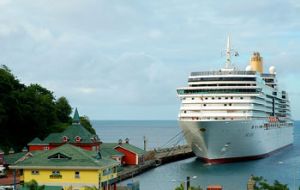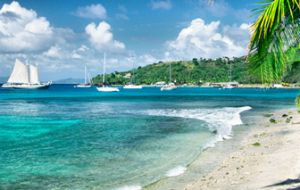MercoPress. South Atlantic News Agency
Caribbean nations beaches disappearing because o rising sea level and recurring storms
 The World Bank said beaches are not the only concern, stating that Caribbean ports and the capital are also at risk from rising sea levels.
The World Bank said beaches are not the only concern, stating that Caribbean ports and the capital are also at risk from rising sea levels.  In St. Vincent and the Grenadines, an estimated 18-30 meters of beach have been lost over the last nine years.
In St. Vincent and the Grenadines, an estimated 18-30 meters of beach have been lost over the last nine years. The World Bank says due to rising sea levels and recurring storms, the beaches in most Caribbean nations have started to disappear. In a new report, the Washington-based financial institution said, in some areas of St. Vincent and the Grenadines, for instance, an estimated 18-30 meters of beach have been lost over the last nine years.
“The highly vulnerable coastal strand and adjacent towns are fighting against increased flood risk from rainfall and storm surge,” said the bank, noting that the issue of challenges faced by small islands around the world was at the center of the just-concluded Third Small Island Developing States (SIDS) conference in Samoa.
The bank said the theme of the conference was sustainable development in view of these states’ unique and particular vulnerabilities.
The World Bank said beaches are not the only concern, stating that Caribbean ports are also at risk from rising sea levels.
“In island states, ports are the economic heart of the country, typically the capital and the island center of commerce,” said the bank, adding that airports are also affected.
To improve the Caribbean’s ability to resist and adapt to the effects of climate change, the World Bank has made some recommendations.
With the poor and vulnerable being most affected by a global sea level rise, the bank urged that land planning be incorporated more into social programs to tackle how exposed people are to risk.
It also recommended the implementation of a preventive system needs to establish an economic recovery and diversification plan following a disaster, as well as increased investment in scientific data collection and flood controls. The other recommendations include land planning and watershed management.




Top Comments
Disclaimer & comment rules-

-

-

Read all commentsAnd who will get the blame for all this
Sep 10th, 2014 - 10:57 am 0we wonder...lol
If you make your home at the edge of the sea then you must not be surprised when any sea activity at all washes you away.
Sep 10th, 2014 - 11:24 am 0With flat beaches up to the edge of forests just a few millimetres is all that is required to 'lose' this amount of beach.
Quite what the do-gooders are going to do other than kick the arses of these “poor” people further inland I don't know. Do a Cnut?
@1. It doesn't matter. Argieland cares nothing for the environment unless it's politically expedient. Who helps the Caribbean? The UK and the US. What does argieland do? Squat. It occasionally rushes out an “aid mission”. That does nothing. Largely because argies are doing what they do best. Cowering. Argieland has to be destroyed.
Sep 10th, 2014 - 11:44 am 0Commenting for this story is now closed.
If you have a Facebook account, become a fan and comment on our Facebook Page!